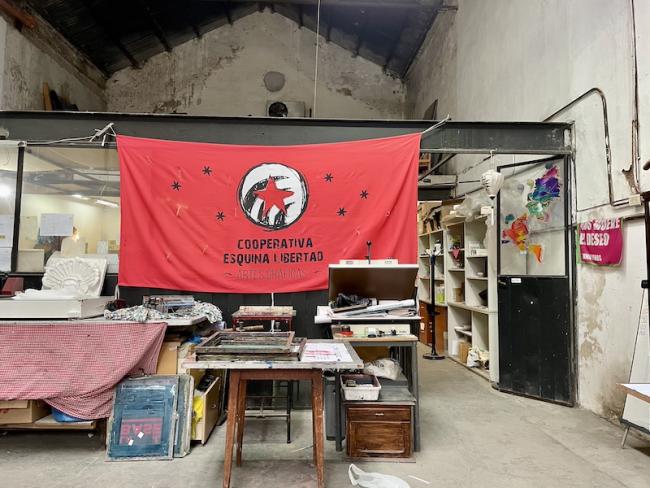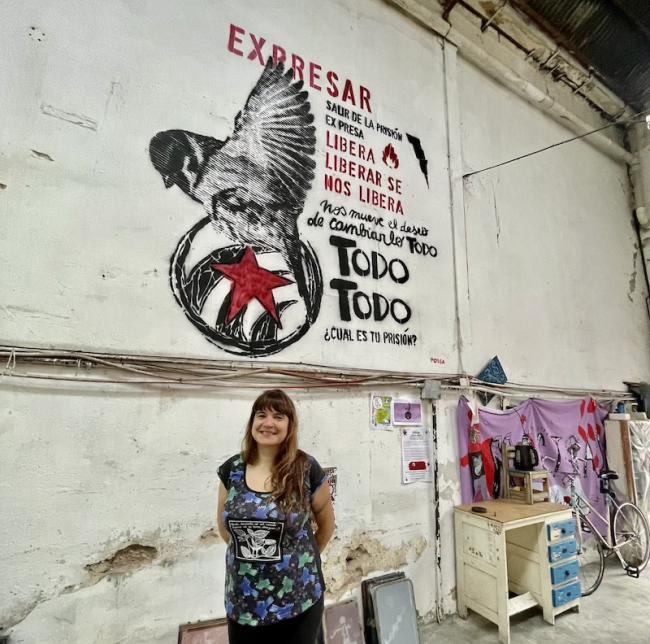
At the back of a large and colorful warehouse in Villa Crespo, a leafy neighborhood in the heart of Buenos Aires, a group of young people at the cooperative Esquina Libertad print cotton bags with a manual heat press. The image on the bags shows the late Norma Plá, a zestful pensioner who became the face of social protests in Argentina in the 1990s.
Plá became a sort of national hero for leading a country-wide protest movement that fought for pensioners’ rights after a neoliberal program to fight hyperinflation was implemented in the late 1980s that drastically reduced public spending. In a moment that for many Argentines became emblematic of the problematic decade, Plá made the then finance minister Domingo Cavallo cry on camera when she pleaded for help.
While much has changed in the 40 years since Plá demanded a dignified pension for retirees, the kinds of policies she and others fought against are making a tragic comeback. She passed away in 1996, but her memory is being revived as protests against austerity measures in Argentina surge once again. Projects like Esquina Libertad, a publishing cooperative that supports people deprived of their liberty, fill critical gaps in social services. In the face of a new wave of austerity, the initiative is struggling to survive.
Since taking office in December, right-wing President Javier Milei has cut social spending by 30 percent, including reducing food aid for soup kitchens and decreasing subsidies for public services like education and transportation. He claims the measures were essential to halt crippling inflation, which reached nearly 300 percent in late 2023. By April, Argentina’s national public sector recorded a surplus for the first time in years and inflation has since slowly declined. But Milei’s policies have come at a high social cost. With rents and services going up at the same time that economic activity has decreased, poverty has skyrocketed. Currently, 52.9 percent of the population is living under the poverty line—the highest rate since 2003, according to official figures.
Some of the groups most affected by the cuts have been social organizations supporting those in greatest need, including cooperatives like Esquina Libertad, or Freedom Corner, inspired by a famous song by Los Piojos. The cooperative runs a communications agency and editorial, printing, and audio-visual production house. It is the first of its kind made up of people who are currently or have previously been incarcerated and their relatives, who assist in running workshops and promoting the cooperative.
Building Tools for Life after Prison
The Esquina Libertad project started in 2010, when a group of women whose loved ones were being held in Devoto, the only federal prison in the city of Buenos Aires, started talking about how they could help their relatives after they were released. Many people who have spent time in prison say this period is the toughest; finding work in Argentina is hard in the best of times, but for those with a criminal record, it’s nearly impossible. The Centro Universitario de Devoto, a public university that offers six degrees and a number of workshops within the prison, bought the women from Esquina Libertad a printing machine as a way to kick start their own business. They now run workshops and trainings in half a dozen prisons across the country.
“The project was born out of a lack of effective public policies to support our communities,” says Ayelen Stoker, one of Equina Libertad’s founders. “The state is not present from the start, does not provide proper education, healthcare, work. The one thing it does is to put people in prison and, when they are done, they release them without any support. That logic of punishment for punishment’s sake does not help resocialize anyone, it only isolates people further.”
Stoker knows about the impact of prisons. First her uncle was imprisoned and then her partner of 12 years. Stoker, like other relatives, found it hard to make ends meet while her partner was incarcerated, let alone find time to visit him in prison. She had to gather enough money to buy food and medicines for him, travel to the prison, then queue for hours to enter.

When her partner was finally released, he found it difficult to find employment given his criminal record. These challenges inspired Stroker to find a creative way to help him, and others, access job opportunities.
“Esquina Libertad was the result of reflecting on the need to have tools to generate inclusion, and it was something that came from us, not from people [who have not experienced prisons],” says Stoker.
Books Behind Bars
Argentina’s prison population has been steadily rising for decades, increasing fourfold between 1996 and 2022. A large percentage of people are held in pre-trial detention for years before their case goes to court. The vast majority of those incarcerated come from marginalized backgrounds and lack access to higher education. The impacts of imprisonment are particularly damaging for women, who are often heads of households, and trans people who suffer a number of intersecting forms of discrimination.
On paper, a government agency called Patronato de Liberados is meant to provide services to formerly incarcerated individuals, including psychological support, assistance in finding work, and strategies for adapting to life after incarceration. In practice, the government provides few resources, putting pressure on organizations like Esquina Libertad to fill gaps in essential social services. The cooperative members rely on a collective model where work and earnings are shared equitably.
“There are many cases of women who don’t have any support, and after being released they say they were better off in prison than outside,” says Silvana Ortíz, who was released from the San Martin prison a year ago and now works for Esquina Libertad. “There is a major difference in the way someone who is released from prison can readjust to life if they have some kind of support and if they don’t,” she adds.
Ortíz loves talking and telling stories. This is why she jumped at the opportunity to take part in a theater workshop organized by Esquina Libertad in San Martin in 2018. She quickly excelled and decided to take other courses, including one in radio production. When she was released, the cooperative offered her the opportunity to continue working with them.
“What authorities propose is to open more prisons, more tough on crime policies when what we actually need are actions to prevent people from ending up in prison in the first place,” says Ortíz.
Esquina Libertad is one of many social projects that are backed by Argentina’s public universities, which run workshops for incarcerated people and have awarded several hundred higher degrees in federal and state prisons. The printing house produces banners, books, magazines, and promotional materials for businesses and runs communications campaigns for shops and organizations. They also offer workshops on alternative printing techniques and audiovisual production.
Argentina is a pioneer in Latin America when it comes to free higher education, including for people deprived of their liberty. Thirty-four of Argentina’s 70 public universities offer undergraduate programs for incarcerated people. Most of these initiatives were created in the last 15 years, according to Ramiro Gual, a researcher and law professor who has taught in Devoto since 2016 in one of the oldest in-prison university programs.
These universities serve as a kind of oasis inside the prison system. Many students say they got involved because they wanted to spend time away from the cell blocks, and they got an education along the way. The student inmates coordinate their courses with visiting professors, organize exams, and actively recruit new students. They also carry out classroom repairs, prepare meals for students, and negotiate with the prison authorities to obtain books and supplies.
Gual says that these programs are not just about people earning a degree, but about “building citizens.” Stoker agrees. “The vast majority of people who take part in the workshops are less likely to commit a crime again,” she says. “That means education generates opportunities.” The programs offer incarcerated individuals both a way to connect to the outside world and to imagine their lives outside of prison.
“It’s Hard to Think About Tomorrow”
Around 500 people are engaged with the Esquina Libertad Cooperative in different ways, including some 50 who are currently deprived of their liberty. Argentina’s economic downturn and cuts to social programs have affected all aspects of the project. For some, the spike in the cost of public transport prevents them from getting to the cooperative. For others, rising unemployment and a decline in the sale of items produced by the cooperative is affecting the ability of cooperative members to put food on the table.
“Everything got immensely more difficult in the last year. I cannot think of a worse time than now. It’s even hard to think about tomorrow,” Stoker says.
She is worried about the impact that Milei’s chainsaw approach to public funding will have on Esquina Libertad. In 2024, Milei reduced the country’s public education spending by 40 percent. In recent weeks, protests to protect free university education have rocked the streets of Buenos Aires. The University of Buenos Aires has said it has seen an 80 percent cut to its budget in real terms, and some public institutions say they cannot afford to keep the lights on, let alone pay a decent wage to staff and professors. In October, Milei vetoed a law that would have guaranteed funding for free public universities.
These cuts have had a domino effect for projects like Esquina Libertad. Stoker says the cooperative offers former incarcerated individuals a pathway out of poverty, which can ultimately serve to reduce crime and prevent people from returning to prison. “We need to think about alternatives to prison through education, work, and healthcare,” Stoker explains. “And we need the state to play an active role and work with civil society organizations like ours.”
In a corner of the Esquina Libertad warehouse, two women and a young man are busy printing Norma Plá t-shirts. One of the women wears a cooperative t-shirt that reads “Without education there’s no future.” As they work, they converse about their daily struggles to get by, an exchange that has become all too common across Argentina. They are preparing for an upcoming demonstration in support of public universities outside of the Congress in Buenos Aires. By invoking the memory of Norma Plá, and by continuing to organize alongside other cooperatives and social movements, they insist that a different world is possible.
Josefina Salomón is an Argentine journalist covering security, crime, and human rights issues in Latin America. She is currently Global Research Fellow at Bard Prison Initiative.

